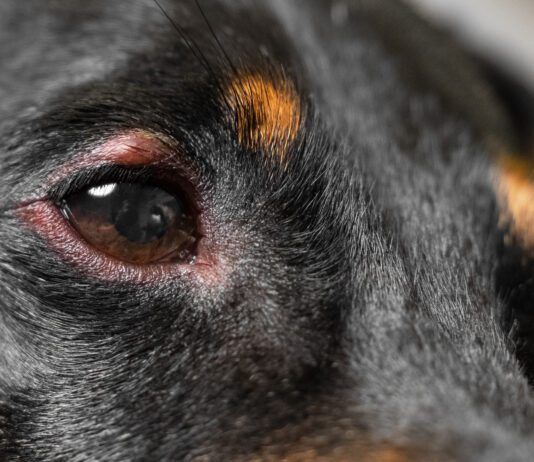Regaining What Was Almost Lost
first discovered Petey at their local humane society shelter in 1990. Scheduled for euthanasia the next day
Understanding Congestive Heart Failure in Dogs
Dogs don't experience heart attacks the way humans do, but this doesn't mean they don't die of heart disease. Heart failure is increasingly common in America's dogs, with many showing symptoms by age seven or eight. Even some young dogs develop congestive heart failure, inheriting the propensity for the disease from their parents. Conventional medical practitioners consider congestive heart failure and other circulatory problems to be progressive and irreversible, but holistic veterinarians know that in many cases, heart disease can be slowed, reversed, and even cured. Understanding heart disease will help you prevent it in healthy dogs and treat it in dogs who are already ill.
Older Dogs and the Onset of Cataracts
Cataracts make the lens of the eye opaque or cloudy, which gradually reduces vision to the point of blindness. In their early stages, cataracts cause blurring and distortion of vision, but they are invisible to the naked eye. By the time most owners notice them, cataracts involve more than 60 percent of the dog's eye. Cataracts often accompany other illnesses, such as diabetes and hypothyroidism (low thyroid function). Surgery performed by a veterinary ophthalmologist is the only treatment considered effective in conventional veterinary medicine and is indicated only in cases where the cataracts are not a result of a secondary disease such as diabetes.
Drinking the Purest Water Possible is Important to Your Dogs Health
Water plays a critical and complex role in the health of all mammals, constituting 55 to 75 percent of the body mass of warm-blooded creatures. A fetus develops in its mother’s amniotic sac and, from birth till death, water bathes and fills every one of a mammal’s billions of cells. In essence, the bodies of people, dogs, and other mammals are water-cooled engines. Releasing water vapor by panting and sweating through its paw pads induces gentle cooling in a dog’s body. Water also lubricates a dog’s joints and muscles, cushions the spaces between each individual cell, and fills up all of the minute hollows in a dog’s body. The principal element of blood, water transports oxygen to all canine body tissues, and helps the white blood cells produced by a dog’s immune system move about its body and fight infections.
Signs That Your Dog is Suffering From Spinal Problems
Maybe your dog's breed is prone to pacing; that's not a concern. But dogs who begin pacing following injury or in their later years may be suffering from spinal problems. In a normal walk pattern, each of the dog's legs move individually in a four-beat gait, with the diagonal pairs of legs moving nearly together. For example, the left hind and the right front legs move forward almost together, with the left hind paw landing a fraction of a second before the right front paw; then the right hind leg goes forward closely followed by the left front.
Hip Dysplasia Surgery Recovery for Dogs
After getting the opinions of three orthopedic specialists and engaging in countless discussions with other owners of dysplastic dogs I made a very difficult decision. I was going to have Sandy undergo a surgery called bilateral femoral head osteotomy (FHO). I knew that I faced challenging post-operative care and rehabilitation, but I assumed that I would do the best I could when the time came.
Nursing Your Dog Back to Health Using a High-Quality Diet
The rescued puppy has diarrhea, gummy eyes, ear mites, and ringworm, but there’s a spark in his eye and his tail is wagging. A stray dog has an upper respiratory infection, skin lesions and worms, yet the person who finds her knows she’ll make a loyal companion. Some of the best dogs come into our lives in damaged condition, and the right support can transform them. Yet when dogs have multiple problems, it’s hard to know what to do first. Many dogs and puppies in pet stores, animal shelters, or on the street suffer from malnutrition and conditions that take advantage of impaired immunity; parasites, bacterial infections, fungi, and viruses all take their toll.
Taking Steps to Making Vet Visits Less Stressful for Your Pup
Let’s face it: Most dogs aren’t crazy about going to the vet. And why should they be? After all, vet visits are stressful at best. They often mean a new environment, slippery floors, and even more slippery exam tables. Vet offices are full of funny smells, scary sounds, strange people, and unknown animals. Plus, the poking and prodding they are subjected to can be uncomfortable and sometimes even painful. It may be overwhelming for even the most easygoing dog.
Protecting Your Dog from Tick Bites and Lyme Disease
Given the potential duration and magnitude of a Lyme disease infection in your dog, we think it's pretty important to do something to protect your dog from ticks, especially in areas where cases of Lyme are common. This is one of the instances where you have to weigh all the factors against each other in this case, your dog's health and vulnerability, the risk of his exposure to ticks, the prevalence of Lyme in your area, and the tick-repelling and tick-killing products available to you to decide what you are going to do to protect your dog. It's not an easy equation; it's more of a complicated algorithm. Let's look at each of these areas and how they interact.
Alternatives to Canine Surgery
I have a young Great Dane named “Bugsy.” I acquired him from a Dane breeder with a good reputation when he was four and a half months old. My only misgiving about the handsome pup was the discovery he had been raised on a terrible food, a brand made with poor quality ingredients and way too much protein and fat for a growing Dane puppy. Though many people think that big dogs must require lots of protein and fat to “grow so big,” giant breed dogs should be fed lower percentages of these nutrients.
Benefits of Vitamin C to Your Dog
For humans, a source of vitamin C in the diet is literally necessary for survival. Early sailors deprived of fresh foods for extended lengths of time often suffered from scurvy
Fighting Cases of Heartworm in Dogs
Heartworms are horrible. No arguments there. Anyone who has ever known or had an infected dog knows how slowly but surely the parasites can sap the animal’s strength and vitality. Going through the treatment to kill the heartworm is no walk in the park either. The “cure” is quite capable of killing the dog in the process of trying to save its life. But some people just don’t like the idea of giving the dog the chemical preventatives that can keep the pooch safe from infestation. And some dogs are sensitive to the drugs, reacting to each dose with vomiting, diarrhea, and other symptoms.















